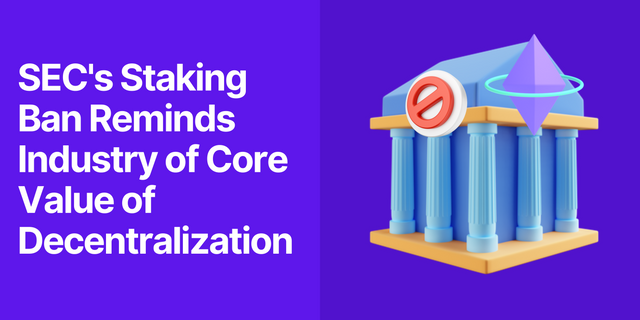The Securities and Exchange Commission (SEC) has recently taken legal action against Kraken, effectively banning the exchange from offering staking-as-a-service for the time being. This move is a short-sighted approach that will only manage to stifle innovation similarly to the way they are now attacking Coinbase with charges, crimp U.S. competitiveness, and force investors to seek potentially riskier options. In this article, we’ll discuss why staking with an incorporated business is antithetical to what makes crypto special, how this move towards decentralized staking is part of a larger trend in the crypto industry, and why a full-on crypto regulation approach threatens to stifle innovation and hamper the growth of the industry.
Staking: The Essence of Decentralization
Staking is used to secure global networks like Ethereum’s, which is designed to be controlled by no one. Since companies operate under the purview of governments, there is an obvious dissonance between them and staking. This might not be a problem if businesses represented a trivial amount of total staking activity, but just Coinbase and Kraken, both domiciled in the U.S., represent roughly 20% of total staked ETH.
It would be great if all government-regulated companies accounted for considerably less than 10% of Ethereum’s staking, or any public blockchain’s for that matter. It might be the case that the fastest way to achieve this change is to ban staking! After Mr. Armstrong’s tweets, decentralized staking projects’ token prices got a boost. Hopefully, this will translate into an increase in their staking percentages. There was another bump upon the Kraken announcement. If the SEC continues, expect to see a significant shift away from centralized to decentralized staking.
Decentralized Staking: A Larger Trend in the Crypto Industry
This move towards decentralized staking is part of a larger trend the crypto industry began last year. When opaque crypto business after business went insolvent like falling dominoes, people began looking for viable on-chain alternatives. Suddenly, the quaint values that defined early crypto adopters weren’t so quaint anymore – e.g., “not your keys, not your coins” or “don’t trust, verify.”
The true nature of cryptocurrency is its core value as being decentralized. It allows for more financial privacy, and this is why Tornado.Cash was created. Tornado.Cash is a decentralized, non-custodial Ethereum mixing service that is completely private, secure, and anonymous. It’s designed to make it possible for people to keep their financial transactions private and secure, without any risk of censorship or surveillance. In other words, it’s a way to protect your financial privacy.
Staking, on the other hand, is a way of validating transactions on a blockchain. It’s a way for users to earn rewards for helping to maintain the security and stability of the network. In proof-of-stake consensus, nodes stake their tokens on the network to validate transactions, essentially allowing those with a greater stake (or more skin in the game) to earn greater rewards. This incentivizes loyalty and historical performance in terms of how effective a node is at validating transactions. Notably, a portion of the stake can be slashed in situations where nodes are down or act nefariously in a bid to protect the network.
The Problem with Full-On Crypto Regulation
Staking is much more energy-efficient than mining, and this is one of the reasons why Ethereum recently made the switch to proof-of-stake from proof-of-work. However, a full-on crypto regulation approach, such as the one being taken by the SEC, threatens to stifle innovation and hamper the growth of the industry. It also goes against the very principles of decentralization that make cryptocurrency unique.
Innovation is the lifeblood of any industry , and the cryptocurrency industry is no exception. By imposing stringent regulations, the SEC and other regulatory bodies run the risk of limiting the potential of the industry and stifling the creativity of those working within it. This is especially concerning given the fact that the cryptocurrency industry is still in its infancy and has the potential to transform the financial landscape in significant ways.
One of the most significant advantages of cryptocurrency is its ability to provide financial privacy. Unlike traditional financial systems, which are subject to government surveillance and intervention, cryptocurrency allows users to transact freely without interference from any central authority. This is a crucial aspect of the cryptocurrency movement, and one that should not be sacrificed in the name of regulation.
Innovation is the lifeblood of any industry, but it must also be tempered by reasonable regulation. The recent actions taken by the SEC are an example of regulatory overreach, but it’s important to remember that there is a silver lining. The ban on centralized staking services will push the industry towards more decentralized options, which aligns with the original values of the cryptocurrency community. Instead of relying on companies like Kraken and Coinbase, individuals will have the option to stake their tokens using decentralized platforms. This will lead to a more resilient and secure ecosystem, which will benefit everyone in the long run. While it’s unfortunate that Kraken had to bear the brunt of the SEC’s misguided regulation, it’s encouraging to see the industry moving in the direction of true decentralization. As long as individuals continue to value privacy, security, and innovation, the future of cryptocurrency remains bright.
